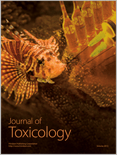
Journal of Toxicology
Scope & Guideline
Connecting researchers to enhance toxicological understanding.
Introduction
Aims and Scopes
- Experimental Toxicology:
The journal emphasizes experimental studies that investigate the effects of various substances, including chemicals and natural extracts, on living organisms, often utilizing animal models to assess acute and chronic toxicity. - Molecular Mechanisms of Toxicity:
Research focusing on the cellular and molecular pathways affected by toxic agents is a core area, including studies on oxidative stress, inflammation, and cellular signaling pathways. - Ecotoxicology and Environmental Toxicology:
The journal encompasses studies that assess the ecological impact of pollutants, including heavy metals and pesticides, on various ecosystems and organisms, highlighting the interplay between environmental factors and toxicology. - Phytotoxicology and Natural Products:
Contributions that explore the toxicological effects of plant extracts and their potential protective effects against various forms of toxicity are a significant aspect of the journal's scope. - Clinical Toxicology and Risk Assessment:
The journal includes research on clinical aspects of toxicology, including case studies, epidemiological assessments, and risk evaluations related to exposure to various toxic substances.
Trending and Emerging
- Oxidative Stress and Antioxidant Defense:
There is an increasing emphasis on the role of oxidative stress in toxicity, with studies exploring how various substances can either exacerbate or mitigate oxidative damage. - Environmental Contaminants and Their Health Impact:
Research on the health impacts of environmental pollutants, including heavy metals and pesticides, is trending, reflecting growing public and scientific interest in environmental health issues. - Natural Products as Protective Agents:
The exploration of plant extracts and natural compounds for their protective effects against various toxic agents is a burgeoning area, with a focus on their therapeutic potential in toxicology. - Neurotoxicity Studies:
Research examining the neurotoxic effects of various substances, including pharmaceuticals and environmental toxins, is on the rise, highlighting concerns over brain health in toxicological studies. - Risk Assessment and Public Health:
There is a growing trend towards integrating toxicological research with public health considerations, particularly in risk assessment frameworks for chemicals and environmental hazards.
Declining or Waning
- Pharmaceutical Toxicology:
Research specifically addressing the toxic effects of pharmaceuticals on human health seems to be waning, possibly overshadowed by more comprehensive studies on natural products and environmental toxins. - Microbial Toxicology:
The exploration of the toxicological effects of microbial agents and their metabolites appears to be decreasing, indicating a shift towards more chemical and environmental toxicology. - Forensic Toxicology:
There has been a noticeable reduction in papers focusing on forensic applications of toxicology, such as drug overdose cases and toxicological analysis related to legal issues.
Similar Journals

Toxics
Connecting global minds for a healthier environment.Toxics is a leading international journal published by MDPI that has been dedicated to advancing the knowledge in the fields of toxicology, environmental health, and chemical safety since its inception in 2013. With an impressive Open Access model, it ensures that all research findings are readily available to a global audience, fostering collaboration and innovation across academia and industry. The journal is esteemed for its rigorous peer-review process and holds notable rankings, including Q1 status in Chemical Health and Safety and Q2 in both Health, Toxicology and Mutagenesis and Toxicology, reflecting its impact on critical research areas. Based in Basel, Switzerland, Toxics provides a platform for researchers, professionals, and students to disseminate significant findings on the implications of toxic substances in health and the environment, aiming to improve public health outcomes and inform regulatory decisions. With its ongoing commitment to high-quality research and relevant access options, Toxics continues to be an essential resource in the domain of toxicology and environmental sciences.

TOXICOLOGY
Advancing toxicological insights for a safer tomorrow.TOXICOLOGY, published by Elsevier Ireland Ltd, is a prestigious peer-reviewed journal specializing in the field of toxicology. With an ISSN of 0300-483X and an E-ISSN of 1879-3185, this journal provides a vital platform for researchers, professionals, and students to disseminate and access groundbreaking studies from 1973 to present, with a convergence set until 2024. Recognized for its high impact, it holds a Q1 ranking in Toxicology category and ranks #18 out of 133 in Scopus's sector of Pharmacology, Toxicology, and Pharmaceutics, placing it in the 86th percentile. While the journal is not open access, it nonetheless offers a rich collection of research articles that enhance the understanding of toxicological science and its applications. The journal's objectives encompass advancing knowledge in the toxicological evaluation of substances, promoting safety in public health, and fostering dialogue among scholars. As a key resource in the field, TOXICOLOGY plays a crucial role in advancing research and informing practices related to toxicological risks and safety assessments.

Toxicology and Environmental Health Sciences
Transforming Knowledge into Action for a Safer EnvironmentToxicology and Environmental Health Sciences is a peer-reviewed journal published by the Korean Society for Environmental Risk Assessment & Health Science, dedicated to advancing the fields of toxicology and environmental health. With an ISSN of 2005-9752 and E-ISSN 2233-7784, this journal serves as a vital platform for researchers, professionals, and students seeking to explore the intricate relationships between environmental risks and public health. Operating from South Korea, it has a converged years span from 2009 to 2024, and currently holds a respectable Q3 quartile ranking in both Health, Toxicology and Mutagenesis and Toxicology. This positions the journal within a critical space for those invested in understanding and mitigating environmental health challenges. Although not an open-access journal, it continues to foster high-impact research, contributing to a better understanding of toxicological sciences and environmental health dynamics. Engage with the latest findings and discussions that shape this evolving field through the insightful articles published herein, reinforcing its importance as a resource for scholars and practitioners alike.
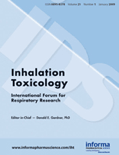
INHALATION TOXICOLOGY
Exploring the Impact of Inhaled Toxins on Health.Inhalation Toxicology, published by Taylor & Francis Ltd, is a premier journal dedicated to advancing the field of toxicology with a particular focus on inhalation exposure and its impact on human health. Established in 1989, this journal provides a vital platform for original research, reviews, and case studies that explore the toxicological effects of inhaled substances, making it essential reading for researchers, health professionals, and regulatory scientists. With an Impact Factor that situates it in the Q3 category in both Health, Toxicology and Mutagenesis, the journal asserts its relevance within the scientific community, particularly emphasizing its contributions as indexed by Scopus rankings in related fields. Although it follows a traditional access model, the journal's commitment to delivering high-quality research continues to foster significant discussions and advancements in understanding inhalation toxicology. For those at the forefront of environmental science and pharmacology, Inhalation Toxicology is an indispensable resource for both current research and future innovations in the discipline.
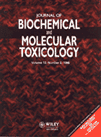
JOURNAL OF BIOCHEMICAL AND MOLECULAR TOXICOLOGY
Pioneering Research in Biochemical InteractionsJournal of Biochemical and Molecular Toxicology, published by Wiley, plays a pivotal role in the advancement of knowledge within the fields of biochemistry, toxicology, and molecular biology. Established in 1998, this esteemed journal has garnered a significant reputation, evidenced by its current placement in the Q2 quartile across several categories, including Biochemistry, Health, Toxicology and Mutagenesis, and Medicine. With an ISSN of 1095-6670 and an E-ISSN of 1099-0461, it serves an international audience, offering critical insights and innovative research that shape our understanding of biochemical interactions and toxicological assessments. While it does not operate on an open-access model, the journal ensures rigorous peer review and high-quality publication standards, making it a valuable resource for researchers, professionals, and students dedicated to the exploration of molecular toxicology. The journal's recognized impact within the scientific community is reflected in its competitive rankings among specialized journals, fostering significant contributions to both academic and applied contexts.
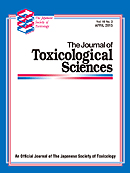
JOURNAL OF TOXICOLOGICAL SCIENCES
Exploring the Complexities of Toxic SubstancesThe Journal of Toxicological Sciences, published by the Japanese Society of Toxicological Sciences, is a prominent academic journal dedicated to the comprehensive study of toxicology and its related fields. Since its inception in 1976, the journal has provided a vital platform for researchers and professionals to disseminate innovative findings and insights in toxicology, with a focus on both experimental and clinical studies. Positioned in the Q3 quartile across various relevant categories, including Medicine (miscellaneous) and Toxicology as of 2023, the journal plays an essential role in advancing our understanding of toxic substances and their effects on biological systems. Although currently not open access, the journal maintains high academic standards and is indexed in Scopus, ranking #96 in Toxicology. Offering unique perspectives from Japan, it encourages global collaboration and discourse among toxicologists, making it an invaluable resource for students, researchers, and industry professionals alike.
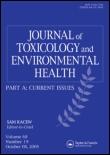
JOURNAL OF TOXICOLOGY AND ENVIRONMENTAL HEALTH-PART A-CURRENT ISSUES
Illuminating Critical Issues in Environmental ToxicologyJOURNAL OF TOXICOLOGY AND ENVIRONMENTAL HEALTH-PART A-CURRENT ISSUES, published by Taylor & Francis Inc, stands as a key resource in the interdisciplinary field of toxicology and environmental health. Operating under the ISSN 1528-7394 and E-ISSN 1087-2620, this journal maintains a strong presence with a Q2 category ranking in Health, Toxicology and Mutagenesis and a Q3 ranking in Toxicology as of 2023. It aims to disseminate critical findings that address contemporary issues in toxicology and environmental health, emphasizing the implications of environmental agents on human health. The journal offers both subscription and open access options, making cutting-edge research accessible to a diverse readership. With coverage of key topics from 1998 to 2024, it is an essential platform for academics, professionals, and students seeking to stay at the forefront of environmental health sciences.

ARCHIVES OF TOXICOLOGY
Elevating Standards in Toxicological ResearchARCHIVES OF TOXICOLOGY is a prestigious journal published by Springer Heidelberg, dedicated to advancing research in the field of toxicology and related disciplines. With a distinguished history dating back to 1930, this journal has continuously provided vital insights and groundbreaking studies, making it a cornerstone in the areas of health, toxicology, and medicine. Recognized for its high impact, it occupies a top-ranking position in Scopus, with remarkable quartile placements in 2023, categorizing it as Q1 in Health, Toxicology and Mutagenesis, and Q1 in Medicine (Miscellaneous). The journal highlights critical research and innovative methodologies, appealing to a diverse audience of researchers, professionals, and students committed to understanding the complexities of toxic substances and their implications for public health and environmental safety. The journal does not currently offer open access, allowing for a more traditional but rigorous peer-review process that ensures the quality and integrity of every published article. Join the global discourse in toxicological science with ARCHIVES OF TOXICOLOGY, where every contribution furthers the understanding of safety and toxicity in our world.
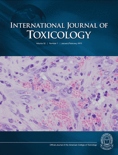
INTERNATIONAL JOURNAL OF TOXICOLOGY
Illuminating the Pathways of Toxicology Research since 1982.The International Journal of Toxicology, published by SAGE Publications Inc, serves as a cornerstone of scholarly research in the field of toxicology, with an established history dating back to 1982. This esteemed journal, ISSN 1091-5818 and E-ISSN 1092-874X, functions within the Q3 quartile in Toxicology, ranking 94 out of 133 in the Pharmacology, Toxicology and Pharmaceutics category per Scopus metrics, reflecting its commitment to advancing scientific understanding in this critical area. The journal not only aims to disseminate high-quality research but also encourages open access to vital studies, thus fostering collaboration and innovation among researchers, professionals, and students alike. With a focus on various aspects of toxicology, including but not limited to environmental, clinical, and molecular toxicology, the International Journal of Toxicology is dedicated to bridging gaps in toxicity research and promoting safe practices across numerous disciplines. As it converges towards 2024, the journal continues to play a vital role in shaping the discourse surrounding the implications of exposure to toxic substances in human health and the environment.
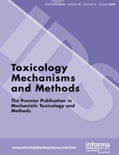
TOXICOLOGY MECHANISMS AND METHODS
Connecting science and safety through rigorous research.TOXICOLOGY MECHANISMS AND METHODS is a distinguished peer-reviewed journal dedicated to the advancement of toxicological research, published by Taylor & Francis Ltd. With its ISSN 1537-6516 and E-ISSN 1537-6524, this esteemed journal features critical studies and innovative methodologies in the field of toxicology, aligning with its mission to enhance understanding of biological mechanisms and risk assessment. The journal holds a commendable Q2 ranking in both the Health, Toxicology and Mutagenesis, and Toxicology categories, as well as strong positions in Scopus rankings, reflecting its influence with a 71st percentile rank in Toxicology and a 69th percentile rank in Environmental Health. Researchers, professionals, and students in the toxicology domain will find this journal to be an invaluable resource, offering open access options that foster widespread dissemination of its findings. Since its inception, encompassing converged years from 1991 to 1995 and from 2002 to 2024, the journal remains at the forefront of critical discourse and innovative research methods, making it a vital platform for advancing toxicological science globally.